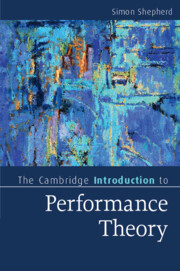Book contents
- Frontmatter
- Contents
- Preface
- Part I Definitions of performance
- Part II The emergence of performance as sensuous practice
- 6 Situationism, games and subversion
- 7 Hippies and expressive play
- 8 Performance as a new pedagogy
- 9 Architecture and the performed city
- 10 New forms of activism
- 11 Happenings and everyday performance
- 12 Body art and feminism
- 13 The arrival of Performance Art and Live Art
- 14 Dance party politics
- Part III Theorising performance
- Closing note
- References
- Index
- Cambridge Introductions to …
14 - Dance party politics
from Part II - The emergence of performance as sensuous practice
Published online by Cambridge University Press: 05 February 2016
- Frontmatter
- Contents
- Preface
- Part I Definitions of performance
- Part II The emergence of performance as sensuous practice
- 6 Situationism, games and subversion
- 7 Hippies and expressive play
- 8 Performance as a new pedagogy
- 9 Architecture and the performed city
- 10 New forms of activism
- 11 Happenings and everyday performance
- 12 Body art and feminism
- 13 The arrival of Performance Art and Live Art
- 14 Dance party politics
- Part III Theorising performance
- Closing note
- References
- Index
- Cambridge Introductions to …
Summary
Among the dissenting voices in 1979, the German artist Klaus Rinke refused to allow his work to be called ‘performance’. The better word, he said, was ‘Aktion’ or ‘Demonstration’. Not only was ‘performance’ a North American term, from the ‘Happening era’, but it also had inappropriate overtones of theatricality (in Bronson and Gale 1979: 195). Similarly his contemporary Franz Walther noted that ‘Ever since the word “performance” was first applied to my work I've had difficulties with it, because for me it has too many theatrical associations. All sorts of words have been used, but I haven't found the one that's right.’ He would prefer to use the word ‘Handlung’ or ‘Aktion art’, but this presents problems when translated into English, in that the word ‘action’ has, he thinks, ‘something programmatic about it’ because it seems to amount to ‘a definition of content’. Therefore, he suggests, ‘A better way to put it in English would be just “doing” – it's simply an activity’ (in Bronson and Gale 1979: 195).
When Rinke and Walther objected to their work being called ‘performance’ it was because it was being put into the wrong category, assimilated to something it was not. Their battle over terminology was about maintaining ownership over the products of their own labour. What they were doing was something more than refusing to let their art become commodity. In circumstances where their work was named by others in a way the artists could not or would not recognise it was in a sense being taken out of their hands. They were becoming alienated from their own work. To insist on the work being named as one wants to name it oneself is to refuse alienation.
Rinke and Walther were not alone. A number of performed practices, whatever they were called, however consciously artistic or not, seem to share an impulse to resist alienation. This is what Stuart Hall thought he saw when he was looking at the hippie counterculture. In an attempt to explain their activities he put them in the larger historical context of ‘post-industrial societies’ where ‘the technical-productive system has been enormously expanded and revolutionised – raised to such mature forms as to have transformed social consciousness itself.’ That transformation of social consciousness produced conditions experienced as alienation. By way of response to it, says Hall, ‘new modes of consciousness’ are being produced, …
- Type
- Chapter
- Information
- The Cambridge Introduction to Performance Theory , pp. 132 - 136Publisher: Cambridge University PressPrint publication year: 2016

